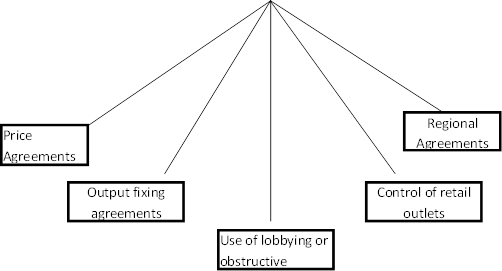Handout: Market Relationships – Suppliers
9th September 2015
Suppliers
Suppliers are as important as consumers to a firm. If a firm does not develop relationships with its suppliers then problems may occur. A firm may derive benefits from gaining control over a supplier:
- secure supplies
- timing of deliveries
- price levels
- long run costs may be reduced
Examples of close relationships:
Coca Cola and Cargill Kraft and its suppliers and Innocent Drinks and its suppliers.
Boots and Jackel Products, makers of Tommy Tippee, have benefited from close co-operation. Jackel have used the production standards demanded by Boots for all the products that it manufactures.
The benefits of closer relationships with suppliers may be:
- Improvement of products through contributions to product design, technology, or ideas for producing new products. Suppliers can help buyers by pointing out ways in which designs can be improved or more desirable materials can be used.
- Improvements in product quality.
- Improvements in “speed to market
- Reductions in total product cost, either through streamlining of work processes (inventory management, new product design, scheduling, etc.) or replacement of costly components with less expensive—but still effective—ones.
- Improvements in customer satisfaction.
A traditional supplier and customer relationship would be one where the customer requests a number of quotes from firms in order to get the lowest price, not necessarily the best quality product.
This approach is gradually being replaced by long term arrangements which are:
- long term enabling suppliers to plan for the future
- mutually beneficial, reducing uncertainty for suppliers
- reduces the number of suppliers needed
- allows R&D to be pursued jointly
Suppliers are often small – consumers often large. Market power may force prices down
Subcontracting
Subcontracting has become increasingly popular because sub-contractors can cut costs in a way that the company could not. This option may allow firms to cut staff. A variation is employing freelance staff.
Collaboration
Not all collaboration is in the consumers interests. Some agreements such as cartels which enable firms to collude are illegal because they act against public interest.
Restrictive practices take advantage of market power in order to restrict competition. Ready Mixed Concrete has been investigated on a number of occasions. In 1994 a number of firms were accused of price-fixing and market sharing agreements. Some firms were fined a total of £56,000.
Common types of Restriction
How might these restrictive practices affect consumers?
|
|
Reasons for merging
Economies of Scale ……………………………………………………………………….
…………………………………………………………………………………………………….
Spreading risk ……………………………………………………………………………..
…………………………………………………………………………………………………….
Synergy ……………………………………………………………………………………….
…………………………………………………………………………………………………….
Rationalisation ……………………………………………………………………………..
…………………………………………………………………………………………………….
Marketing strategy ……………………………………………………………………….
…………………………………………………………………………………………………….
Asset Stripping …………………………………………………………………………….
…………………………………………………………………………………………………….
Rewards for Managers ………………………………………………………………….
…………………………………………………………………………………………………….
Defensive motives …………………………………………………………………………
…………………………………………………………………………………………………….
Takeovers are seen as a way of achieving a short cut 50% of all takeovers fail to achieve the gains hoped for. Takeovers may result in a loss of focus
Decisions on takeover may be taken on past rather than current performance
Acquisitions may not be integrated into a firms strategic planning
E.G. Thorn EMI expanded and diversified. This strategy was rejected and the firm sought to focus in its field of expertise.
Joint Projects
Two or more businesses join together for specific advertising or programme
e.g. Persil and Hotpoint
Boots and WH Smith to form Do-It-All
Vertical Integration
Companies may see it as a way of guaranteeing supplies and markets
Profits and Growth
Most businesses want to be efficient in order to achieve competitive advantage
Strategies:
- lean production
- improved management strategies
Cutting costs can lead to reduced prices – increasing market share.



0 Comments